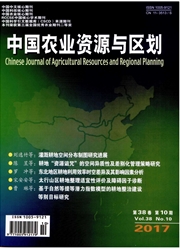

 中文摘要:
中文摘要:
实现资源开发与非自愿移民搬迁安置的平衡,是区域社会经济持续发展的重要步骤。以新疆典型县市为样本区,在问卷调查的基础上,采取Binary Logistic回归模型分析方法,从非自愿搬迁移民的个人基本特征、自然因素、经济因素、政策制度因素4方面10项指标构建指标体系,分析西部"矿农复合区"非自愿移民搬迁的障碍因子。分析结果表明:征地补偿标准、土地征收政策因素影响最为显著且与非自愿移民搬迁意愿呈正相关关系,被征地面积、安置方式、社会保障情况、年龄等因素影响较为显著,而收入来源、受教育程度、家庭人数、家庭年收入水平4项指标影响不显著。
 英文摘要:
英文摘要:
Realizing the balance between resources development and the relocation of involuntary migrants is an important step of the sustainable development of regional social economy. This research took typical counties and cities of Xinjiang as sample areas and adopted Binary Logistic regression model analysis method on the basis of questionnaire survey to construct indicator system from 10 indicators and analyze the relocation obstacle factors of the "mining and agriculture area" of the west region. The analysis results show that the compensation standard for land expropriation and the land expropriation policy had the most significant influence and showed positive correlation with the relocation will of involuntary migrants, and the land acquisition area, resettlement ways, so- cial security situation and age had relatively significant influence, while the source of income, level of education, the number of family and annual household income level had no significant influence. Regulatory mechanism played an important role in promoting the smooth implementation of the relocation work.
 同期刊论文项目
同期刊论文项目
 同项目期刊论文
同项目期刊论文
 期刊信息
期刊信息
